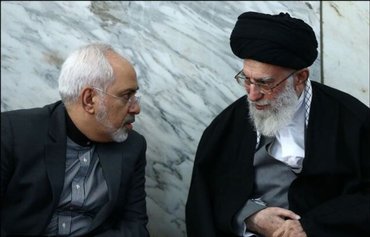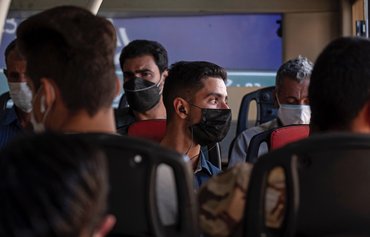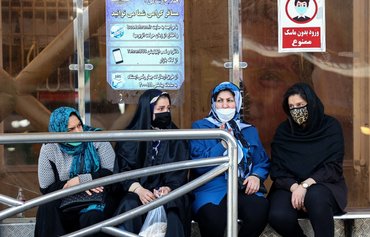For the past four decades, the Iranian regime has careened from one crisis to another, while simultaneously creating crises in the region as part of its interventionist foreign policy.
Its chronic mismanagement of the country and its misplaced priorities amount to self-sabotage, observers said, as evidenced by the level of public unrest it has caused.
In recent years, each new crisis has followed directly on the heels of the last, and the situation has now reached the point where the Iranian government is having to deal with several crises at once.
Thousands of Iranians have died from the government's mismanagement of the coronavirus pandemic. And the current economic crisis has left the country in shambles and its people in need.
![Wearing a protective facemask, Iranian leader Ali Khamenei casts his vote for the presidential election at a polling station in Tehran on June 18. Khamenei, who has been criticised for his handling of the pandemic, initially blocked the import of certain coronavirus vaccines but recently reversed himself. [Atta Kenare/AFP]](/cnmi_am/images/2021/09/15/31654-Kamenei-Iran-vote-600_384.jpg)
Wearing a protective facemask, Iranian leader Ali Khamenei casts his vote for the presidential election at a polling station in Tehran on June 18. Khamenei, who has been criticised for his handling of the pandemic, initially blocked the import of certain coronavirus vaccines but recently reversed himself. [Atta Kenare/AFP]
The regime's expansionist policies, spearheaded by the Islamic Revolutionary Guard Corps Quds Force (IRGC-QF), have led the country to the brink of bankruptcy.
This intervention has resulted in disastrous consequences across the region, as a result of the actions of the IRGC's proxies in Iraq, Yemen, Lebanon and Syria.
The Islamic Republic also faces major environmental challenges, with severe drought ravaging most parts of the country and devastating farmland.
The Hour ol-Azim wetlands in southern Iran are now almost completely dry and have caught fire several times over the past year, with some blaming the regime for the outbreaks that may have resulted from its effort to extract oil.
In an interview with Iran's state television, environmental activist Mohammad Darvish said the government built a road and a rig in the centre of the wetlands to extract oil and thereby turned it into a salt marsh.
The government's destructive policies have sparked nationwide protests.
During protests that began in the late spring and continued through mid-summer in different provinces, some demonstrators chanted separatist slogans, threatening the country's sovereignty.
Many observers say the resistance movement is getting bolder and that widespread violence against the regime is a real possibility.
Misplaced foreign policy priorities
Iran desperately needs to improve its relations with the West, which is conditioning relief on sanctions and a return to the 2015 nuclear deal -- known as the Joint Comprehensive Plan of Action (JCPOA) -- on Tehran stopping its regional intervention and illegitimate nuclear activities.
In recent months, the Iranian regime suspended some International Atomic Energy Agency (IAEA) inspections -- a move the global nuclear watchdog said had "seriously undermined" its monitoring efforts.
Just this week upon his return from a trip to Iran, IAEA chief Rafael Grossi voiced concern about the country's covert nuclear activities in four locations where uranium was found.
But it appears that for the regime, pursuing interventionist policies in the region, as well as enriching uranium and continuing nuclear activities, takes priority over the country's well-being and the public's prosperity.
Iran-based intelligence analyst Sassan Tamgha said that Iranian leader Ali Khamenei considers victory in the region more important than domestic successes in meeting his own people's desperate needs.
He also pointed out that "what the regime calls victory, or 'exporting the revolution', is in fact arming extremist groups in Lebanon, Yemen and Syria in order to spread unrest and terrorism".
Petitions for Khamenei's resignation
In recent months "we have seen a number of semi-public figures and various social groups directly targeting Khamenei", said Tehran-based economist Ahmed Tavakolabadi.
This seems to have been fueled by the regime's gross mismanagement of the coronavirus crisis, he said, noting that Khamenei had initially banned the purchase of Western-made vaccines, recently backtracking on that decision.
Khamenei's change of course was seen by many as too little, too late for the COVID-ridden country.
Many Iranians have been writing letters and signing petitions asking Khamenei to step down, Tavakolabadi said, noting that "today, more than ever, ordinary people want him to resign, and even be put on trial".
The Iranian regime's domestic and foreign policies have fueled provincial hostilities inside Iran as well, causing rivalries and tribal grudges among the people of different provinces that may eventually lead to major unrest, he said.
Meanwhile, widespread corruption within government agencies has severely worsened the country's economy, damaging Iranians' livelihoods.
Iranians desperately need sanctions to be lifted that will enable Iran's oil to be sold and address the shortage in revenue. But for that to happen, observers warn, Iran must change its behaviour on the regional and domestic fronts.

![Iran's Hour ol-Azim wetlands burn in this photo posted online in November. [YJC.news]](/cnmi_am/images/2021/09/15/31607-Hour-alAzim-wetlands-600_384.jpg)






